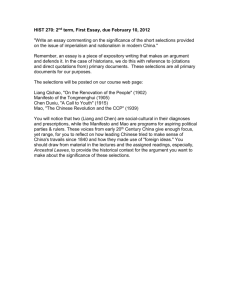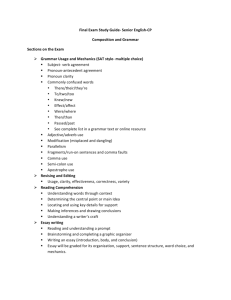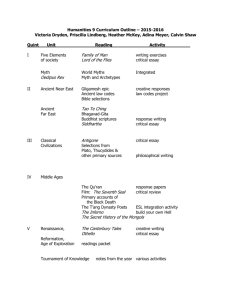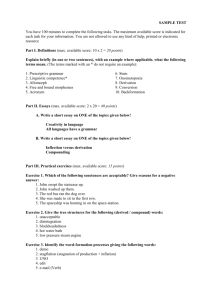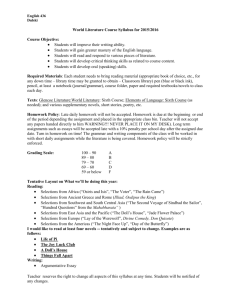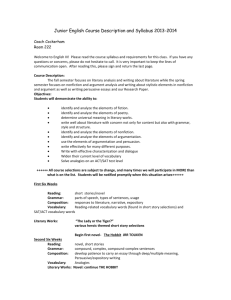Introduction to High School English—Grade 10
advertisement
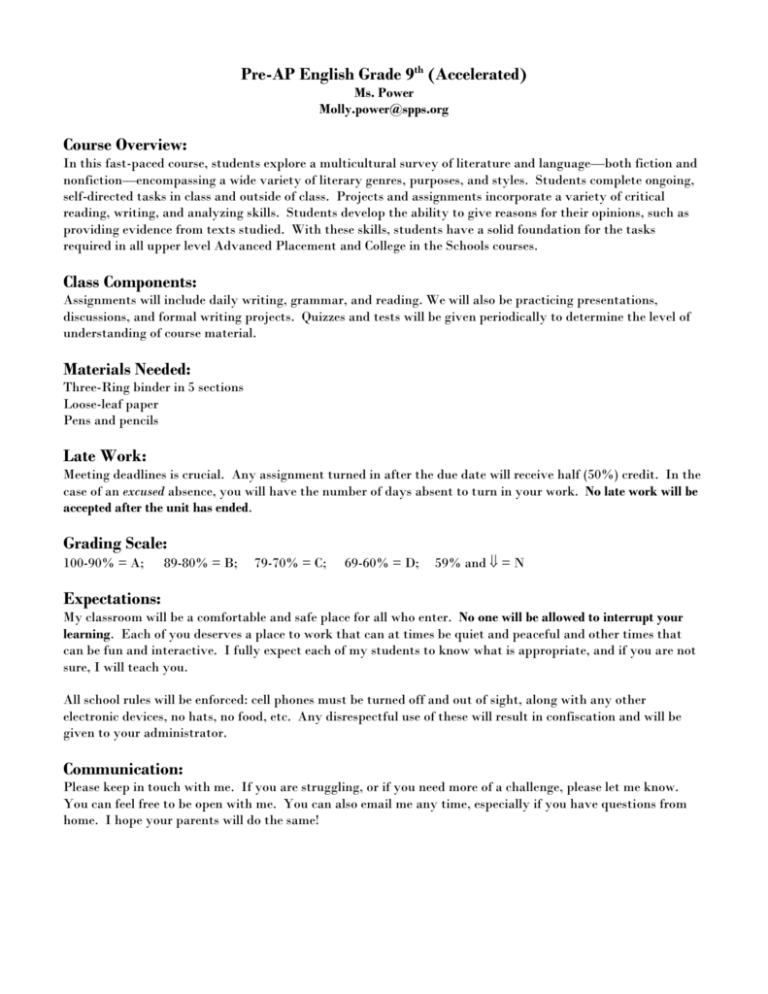
Pre-AP English Grade 9th (Accelerated) Ms. Power Molly.power@spps.org Course Overview: In this fast-paced course, students explore a multicultural survey of literature and language—both fiction and nonfiction—encompassing a wide variety of literary genres, purposes, and styles. Students complete ongoing, self-directed tasks in class and outside of class. Projects and assignments incorporate a variety of critical reading, writing, and analyzing skills. Students develop the ability to give reasons for their opinions, such as providing evidence from texts studied. With these skills, students have a solid foundation for the tasks required in all upper level Advanced Placement and College in the Schools courses. Class Components: Assignments will include daily writing, grammar, and reading. We will also be practicing presentations, discussions, and formal writing projects. Quizzes and tests will be given periodically to determine the level of understanding of course material. Materials Needed: Three-Ring binder in 5 sections Loose-leaf paper Pens and pencils Late Work: Meeting deadlines is crucial. Any assignment turned in after the due date will receive half (50%) credit. In the case of an excused absence, you will have the number of days absent to turn in your work. No late work will be accepted after the unit has ended. Grading Scale: 100-90% = A; 89-80% = B; 79-70% = C; 69-60% = D; 59% and = N Expectations: My classroom will be a comfortable and safe place for all who enter. No one will be allowed to interrupt your learning. Each of you deserves a place to work that can at times be quiet and peaceful and other times that can be fun and interactive. I fully expect each of my students to know what is appropriate, and if you are not sure, I will teach you. All school rules will be enforced: cell phones must be turned off and out of sight, along with any other electronic devices, no hats, no food, etc. Any disrespectful use of these will result in confiscation and will be given to your administrator. Communication: Please keep in touch with me. If you are struggling, or if you need more of a challenge, please let me know. You can feel free to be open with me. You can also email me any time, especially if you have questions from home. I hope your parents will do the same! Pre-AP 9th Grade Unit 1: Mythology (two weeks) Guiding Question: What’s in a classic hero? Objectives and Terms: Heroism, tragic flaw, epic poem, epic hero, Greek Mythology, pantheon, Greek and Latin roots, prefixes and suffixes, online moodle discussion, archetypes Grammar Highlights: Greek and Latin roots, word forms, functionality and parts of speech Reading Selections: Archetypes selection from How to Read Literature Like a Professor Selections from Edith Hamilton’s Mythology: “Perseus” and “Hercules” The Odyssey by Homer “A Hero” by Robert W. Service Final Products: Archetypes Projects Greek/Roman gods and goddesses research Odyssey Board Game Word Parts test Heroism Prompt: timed writing Unit 2: Lit Circles (MWDS) (two weeks) Guiding Question: How do I determine importance while I read? Objectives and Terms: Genre, historical context, biographical context, narrator, plot style, quote, character, setting, symbolism, theme, elements of plot Reading Selections: A choice of one of the following The Pearl by John Steinbeck To Kill a Mockingbird by Harper Lee The Bluest Eye by Toni Morrison The Lord of the Flies by William Golding Final Product: Major Works Data Sheet Group Presentation Essay test based on previous Advanced Placement essay topics (Literary Analysis) Unit 3: Drama Guiding Question: How do we unlock the secrets of a text? Objectives and Terms: Finding evidence in the text, character development/analysis, protagonist, antagonist, foil, archaic language, literary analysis, vocabulary from the text, symbolism Grammar Highlights: Language past and present, irregular verbs, subject/verb agreement Reading Selections: Romeo and Juliet by William Shakespeare Final Products: Translations/Quote Analysis Promptbook: Analysis Project Memorization Literary Analysis Test Unit 4: Novel Guiding Question: How do we read between the lines? Objectives and Terms: Persuasion, argument, ethos, pathos, logos, evidence, quote response, discussion, tone, symbolism, symbolic settings, vocabulary from the text, online Moodle discussion Grammar Highlights: Daily Oral Language Reading Selections: Of Mice and Men by John Steinbeck “To a Mouse” by Robert Burns “John Steinbeck’s Speech at the Nobel Prize Banquet” by John Steinbeck Final Product: Of Mice and Men Vocabulary and Comprehension Test Court Trial Paperwork (gathering evidence from the text) Court Trial Performance (persuasion) Essay: Position Paper with textual citations Unit 5: Short Stories Guiding Question: How do we get the most of reading? Objectives and Terms: style, diction, syntax, tone, connotation, voice, irony, intertextuality, allusion Grammar Highlights: Syntax: Sentence structure, types of sentences, commas and punctuation Reading Selections: From How to Read Literature Like a Professor by Thomas C. Foster “The Story of an Hour” by Kate Chopin “Barbie-Q” by Sandra Cisneros “Girl” by Jamaica Kincaid “The Cask of Amontillado” by Edgar Allan Poe “The Garden Party” by Katherine Mansfield “Landscape with the Fall of Icarus” by William Carlos Williams “Musée des Beaux Arts” by W.H. Auden Final Products: Literary Analysis Essay on “The Garden Party” Style Test: Diction/Syntax Grammar Basics Test Personal Narrative with a borrowed style Unit 6: Independent Reading and Analysis Guiding Question: How do I determine importance while I read? Objectives and Terms: Genre, historical context, biographical context, narrator, plot, style, quote, character, setting, symbolism, theme Reading Selections: A choice of one of the following Fahrenheit 451 by Ray Bradbury Night Flying Woman by Ignatia Broker Animal Farm by George Orwell The House on Mango Street by Sandra Cisneros Final Product: Major Works Data Sheet Prompted Essay test based on previous Advanced Placement essay topics
